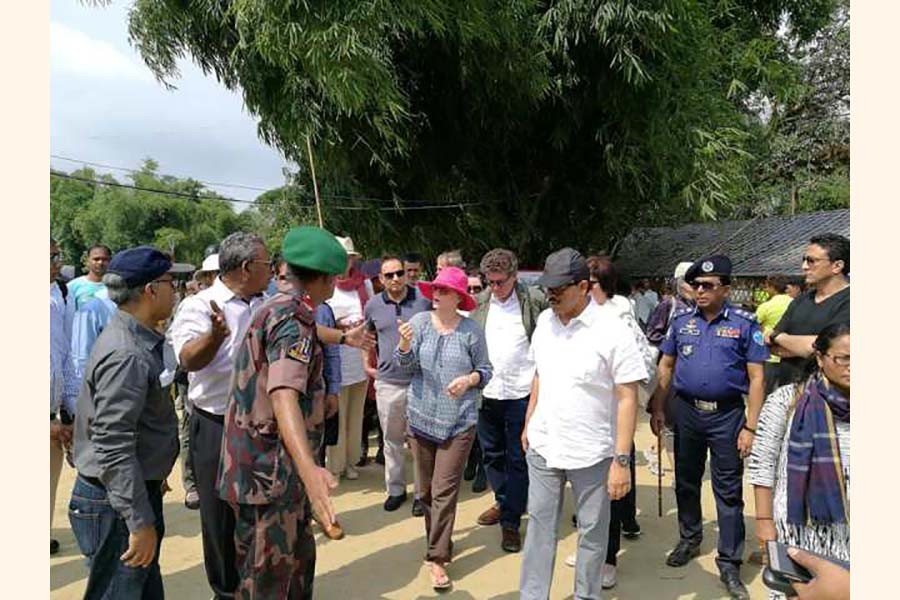Myanmar under the rule of military generals was wrapped in an iron curtain but it did not earn the infamy of a rogue state then. With Aung San Suu Kyi becoming the de facto head of that country's government, it is one such dispensation now. Under intense pressure from international communities, it allowed a United Nations Security Council (UNSC) team to visit its Rakhine state from where a total of more than one million Rohingya Muslims have been driven out. Although the Myanmar government neither denies nor accept the mass murder, brutal torture of the Rohingya people, random rape of their women and torching their homes in order to get rid of them, the chief of the army has denied involvement of members of the army in sexual crimes. He made the claim that such a crime was never committed in the Myanmar army's history.
His emphasis on the matter is significant on more than one account. Rape has been used as a potent weapon for ethnic cleansing in many parts of the world including Bangladesh in 1971. Or, it may be an attempt at parrying the question of other forms of crimes used in Rohingya persecution. In effect, here is a tacit admission that the army resorted to killing, torture and arson but not in sexual violation.
Is the UNSC delegation going to be convinced after what it has observed in the Rohingya refugee camps in Bangladesh? The team members listened from the horse's mouth to the ordeal the Rohingya men and women went through before travelling to Bangladesh. How much the UNSC team was allowed to see of the scorched settlements in the Rakhine state will be always in doubt. The doubt stems from the fact that the Myanmar government earlier did not agree to such a visit. It grudgingly gave in to the demand when the pressure started mounting on it. Surely, it did all it could to show the UNSC delegation as little signs of its ethnic cleansing as possible.
However, this exercise is rather perplexing. It is perplexing because in today's world, hardly an inch of land on the planet remains out of focus of satellites. Now that the United States of America has been playing tough on Myanmar on account of the Rohingya issue, its satellite pictures can more than serve the purpose of accusing the Myanmar government. An on-field visit can be hopelessly useless after months during which time many of the evidences of atrocities can be erased. It was reported earlier that the government levelled homesteads of Rohingya villages in order to build new settlement for local Buddhists and Mogs.
That Prime Minister Sheikh Hasina especially solicited Russian and Chinese active role in the repatriation of the Rohingya people is not for nothing. In fact, support from these two UNSC permanent members encouraged this energy and mineral-rich country to defy the opinion of the international community. Along with China, India also eyes ploughing dividends from natural resources there. The economic stakes and geo-strategic considerations of these countries have largely been responsible for not giving Bangladesh the political support it deserves. On the same token, they do not put enough pressure on Myanmar for an early solution to the crisis lest they lose their commercial interests in that country.
This is the reason behind the UNSC soft-pedalling on such matters as imposition of trade sanctions against Myanmar. Censuring Myanmar in the UNSC meeting thus never figured on the agenda. This shows how politics and commercial interests have combined to vitiate a worsening human crisis. Although the Human Rights Watch and 79 other non-government organisations appealed to the UNSC in December, 1917 to take 'prompt, concerted and effective' international action because condemnation would not be enough to change the Myanmar government's heart. Such actions were ruled out and the roguish government went on persecuting the Rhingya with renewed vigour. Consideration for human misery took a back seat.
With the monsoon setting earlier this year, the living condition of the Rohinya population in the camps looks ominous. The Russian delegate in the UNSC team had no intention of hiding his view on the outcome of the team's visit. He said that there was no reason to be particularly optimistic about the outcome of the UNSC visit to Bangladesh and Myanmar. No immediate solution to the problem of repatriation was on the cards.
Humanity has thus become a casualty at the hands of intriguing international politics. The Rohingy people are used as a pawn on the chessboard of international politics. It happened in Bosnia Harzegovina until sanity on the part of big players prevailed. However, in Iraq less provocation was used as an excuse for carrying attacks on that country. Before it, cold war rivals played a nasty game in Afghanistan in order to beat each other. In Syria though, it is a different game now. The old foes are sharing the war theatre but not quite facing each other frontally.
Nothing happened in those countries on a scale it has done in Myanmar and yet the Rohingya population is friendless. Bangladesh is a reluctant host because in doing so it is counting enormous costs in terms of resources and environment. When Myanmar's leaders deserve to be tried in the International Criminal Court, big powers are not acting in the way they should. Had they done so, the issue of Rohingya repatriation did not linger like this.


